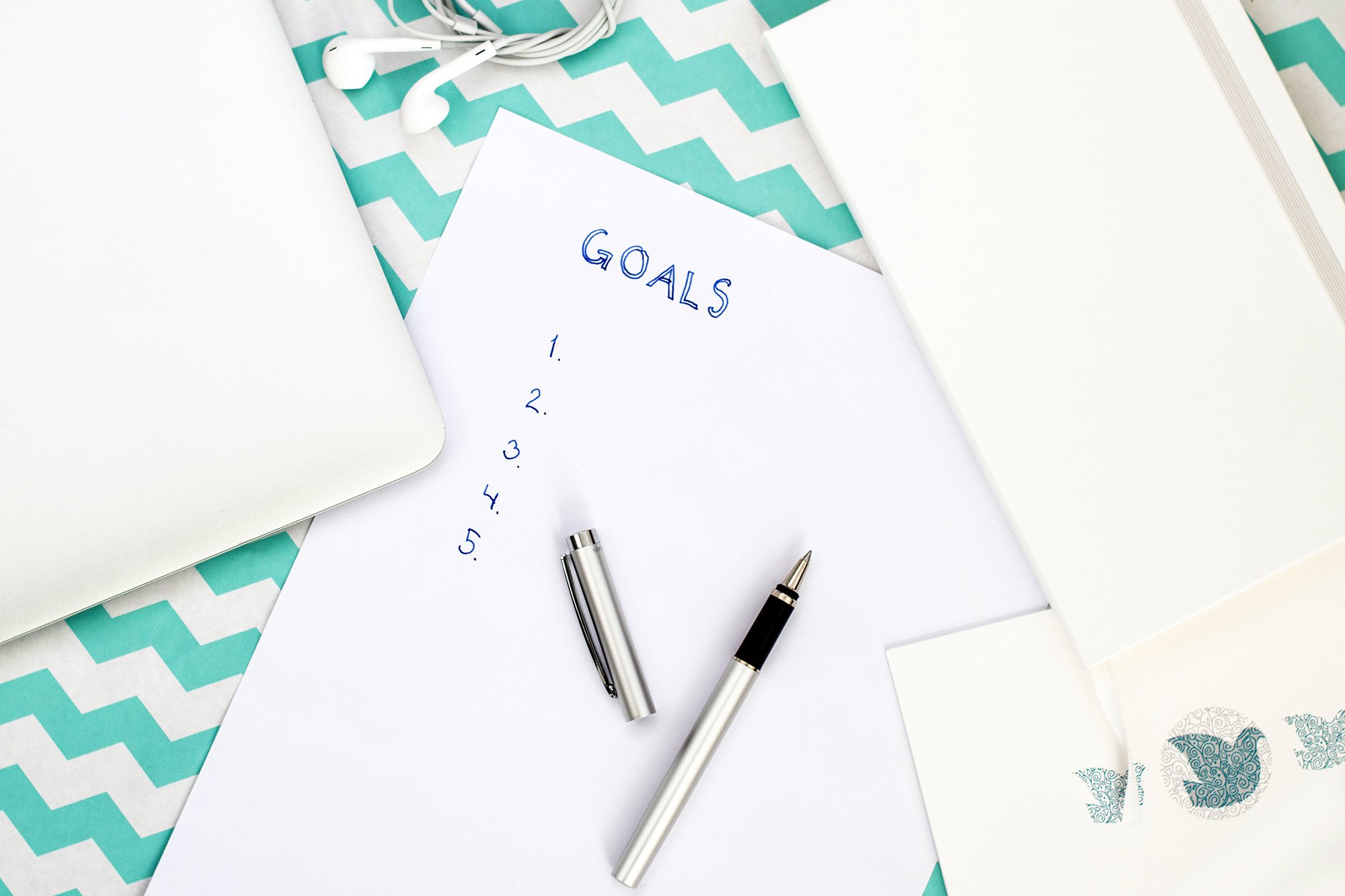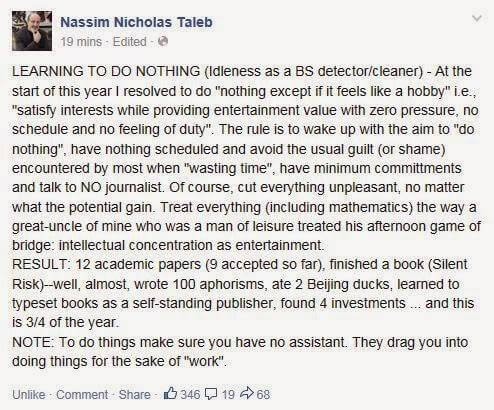
These are my own experiences and reflections and don’t necessarily reflect other people’s experiences.
1) Setting goals just doesn’t work
Some people set goals and they are amazing at keeping them (rare). I’m not one of them. I’ve looked back at my patterns and I’ve seen that there’s no positive correlation between setting goals and level of ‘accomplishment’.
Actually, there’s an inverse relationship between setting goals and accomplishment for me. Meaning the more I set goals the less I actually accomplish.
2) Setting goals takes the fun out of an activity
I’ve found the act of setting goals made me more ambitious, but at the same time, it lessened the enjoyment of the actual work that needed to be done to accomplish the goal.
When I do work spontaneously, that’s when work becomes play. When it’s planned, it becomes drudgery.
3) Goals help create anxiety and depression
Setting goals are bad because they create anxiety when trying to keep them and also when you fail.
In creating illusions about the future, they also create depression. You go from a high when you’re creating a goal -and sometimes in the active process of trying to accomplish it – to a low when the illusions you’ve built about your future come crashing against reality.
When I stopped setting goals, I also stopped having cyclical dips in my mood and no anxiety.
3) Goal-setting is a distraction and often a form procrastination
I’ve found for myself that goal-setting turned out to be one big distraction.
Goals are very enjoyable to create, but setting them also makes them less enjoyable to implement.
I’m more prone to set goals when I don’t like what I’m doing. I believe that people do this do distract themselves from the life they’re living – a form of procrastination.
When you’re in a state of flow and really enjoying what you’re doing, you’re not interested in setting goals.
4) Goals create illusions
People love thinking about what life will be like when we accomplish XYZ. If you look back at your history, you’ll see that all of your thinking was just an illusion. Life usually isn’t much better now than it was – at least not because of your goals/goal setting.
Are you happier now than you were 5 years ago after hundreds or thousands of goals? Unlikely.
5) Goals are there to motivate us to do things we don’t want to do
People set goals to accomplish something they wouldn’t do if not for setting the goal.
I believe when we stop setting goals, our biology knows what we need to do to make us happy. We are drawn to what we truly want to do in life.
6) Goals delay you from finding your passion
The point of a goal is to try to get you to do something you wouldn’t ordinarily do.
If you’re passionate about something then I promise you that you don’t need to set goals to do it. You will be driven to it. You will not be able to hold back if anything.
The more goals you set, the less time you’re engaged in activities that you actually like to do or are passionate about.
Whatever it is you like to do, eventually you will become a master at it. I can’t promise you’ll make a lot of money doing it, but you’ll almost certainly enjoy your life more.
7) Setting goals kills creativity
There’s no question that when I don’t set goals I am significantly more creative.
If you listen to Tim Ferriss’s podcasts, he discusses writer’s block, creativity, and happiness a lot. I see he’s struggling with these things while I don’t. Ferriss sets goals.
Whenever I also set goals, I have the same problems as him – writer’s block, diminished creativity and I become significantly less happy.
At its core, creativity is a process of discovering something that you didn’t plan to discover. Goals are accomplishments that are planned.
When I don’t set goals, I have an endless amount to write about, no issues with happiness, and my creative mind is in overdrive. With no goals, I start getting a bug to write about a topic and I have an endless amount to say.
In fact, I have writer’s overflow where I don’t feel I can get most of my ideas out, which is why I don’t even reread articles (hence the errors). For every article I write, there are 10 that I’m itching to write but don’t have the time to.
When I do set goals, it takes me much longer to write an article and I also get writer’s block.
8) Goals require will power
Whenever we set goals, it requires willpower to implement them. Willpower is a limited resource.
You get burnt out when you expend too much will power. I used to get burnt out all of the time, but now I’ve learned how to get things done using limited willpower.
The result is that I don’t need vacations or long breaks to ‘recharge’. I am always charged because I make sure to never drain my battery.
The Doer vs The Creator
I’ve noticed that society has both ‘doers’ and ‘creators’. Some people are both or none.
The do-ers love doing and the creatives love creating. Do-ers like the process of getting things done. Creatives like the process of thinking/imagining and creating something new or novel.
If you are a doer you will have the bug to get things done. If you are a creator, you will have the bug to create. This will happen whether you set goals or not.
There’s obviously a spectrum in each of these. Some people are extreme doers and creators – Jobs, Musk, etc…
Setting goals doesn’t make these people accomplish. It’s their innate drive.
Do you accomplish more with goal-setting?
With regard to accomplishments, I think goals can make you accomplish more in the short term, but less in the long term.
This is because the anxiety and heightened arousal that goals create cause you to get more done in the short term.
However, that heightened arousal will cause you to accomplish less in the long term, will wear you down and cause bouts of depression eventually.
If you are in a creative field, then I’d strongly advise against goal-setting.
Here’s what Taleb has to say:
Goals are a reflection of your drive, not the cause of it
Often people set goals to accomplish some aspect of their desires. Whether you set goals or not, your innate biology will drive you to get things done.
Some people might say that they notice a correlation between their goals and accomplishments. Be careful of the cause and effect fallacy.
I say everyone has a core desire to accomplish and the setting of goals is merely a reflection of that innate, biological desire. So our biology causes us to both set goals and get more done. The goals themselves aren’t what principally influence you to get things done.
So the people who set goals are generally innately more ambitious, but I believe they’d accomplish a similar amount (perhaps more in the long term) if they didn’t set goals.
Now, I’m not against setting goals if that’s what you feel an impulse to do. I am against setting goals for the sake of accomplishing more.
Goals as an itch
Sometimes people feel aimless without goals. They need goals to satisfy their need for certainty and control. If you feel you need goals, then it’s your prerogative to set them.
However, my question to you is have you ever tried to let go and see what your productivity is like without goals?
Don’t mistake goals for a to-do list or a plan
I want to be clear that setting goals is not that same as making a list of things that you need to do.
I keep my to-do list as short as possible, but things will always need to get done.
Realizing that you have to do something isn’t the same as setting a goal. I know I need to go to the bank today, it’s not my goal.
Even if you don’t necessarily have to do something, you might say that it would be beneficial to prepare for something in the future and make a time slot for tomorrow to do it. That’s not a goal, it’s a concrete to-do list. Goals are further into the future like setting goals for 2015 and beyond.
As an aside, you should realize that by simplifying your life you can probably cut that to-do list of yours by 80%.
I’m also not saying that you shouldn’t step back every once in a while and reflect on where your life is going and if you’re happy with the direction.
If you’re not happy, you definitely should think of a plan to switch paths to one that makes you happier. But that’s not either a goal.
Goals are saying you want to accomplish something. In developing a plan, there’re no outcomes to achieve.
For example, you might realize that you’re interested in a different field. So you research it, see if it’s feasible and make the necessary moves. You can write it down if it helps your thinking process, but it’s not a goal – it’s a plan.
The Self-Experiment
If you can’t do this because you’re really busy then no worries – just do a thought experiment.
Here’s the experiment: if you’re an ambitious person, I want you to try to stop setting goals and do absolutely nothing for a day or more.
The only caveat is that you can’t distract yourself with social media, TV, friends, etc…Just sit at home and do nothing. Remember, no goals.
If you’re burnt out, you might like this for a few days or a week. But after that, it’ll drive you insane.
Elon Musk was asked if he would ever like to retire and just vacation for the rest of his life. He responded that he’d enjoy this for a few days, but he’d shoot himself in the leg if after a week.
He’s not wrong. Ambitious people have a bug to want to accomplish. Whether you set goals or not you will still have this bug that will impel you to do or create, depending on personality.
I’ve been living this experiment more or less for the past 4 months.
My experiment was even more extreme in that I didn’t restrict myself to anything. In the beginning, I spent a few good weeks watching TV and nothing else – like 16 hours a day. But then I got sick of it.
When I go for my walks, however, I find myself setting goals and thinking about the future -not to help me accomplish more, but because I can’t help it. It’s just mental masturbation. The important point is that I look at goal setting as a diversion that can have negative effects, not as something to help me accomplish.
Caveats
1) While setting goals for yourself can be a bad idea, setting goals for your employees is a different story. This is because generally, you’re not interested in the growth of your employee as a person or their skill-set 5 years down the line. You don’t know how long your employee is going to work for you. The point of an employee is for them to get things done in the short term.
2) Also, if you’re married with kids, it’s likely impossible to implement this. It’s usually the case that your spouse and kids have adapted to a certain lifestyle and income level. It’s going to be much harder to structure your life in a way that’s conducive to maximal creativity.
3) In non-creative fields, I don’t know if goal setting is more helpful or harmful in the long term It’s my opinion that there’s a good chance that having to-do lists is better than having goals.

